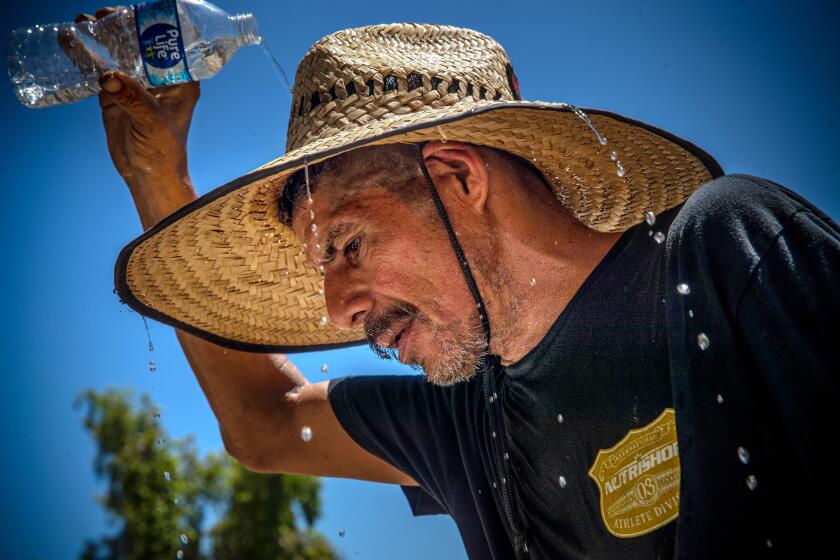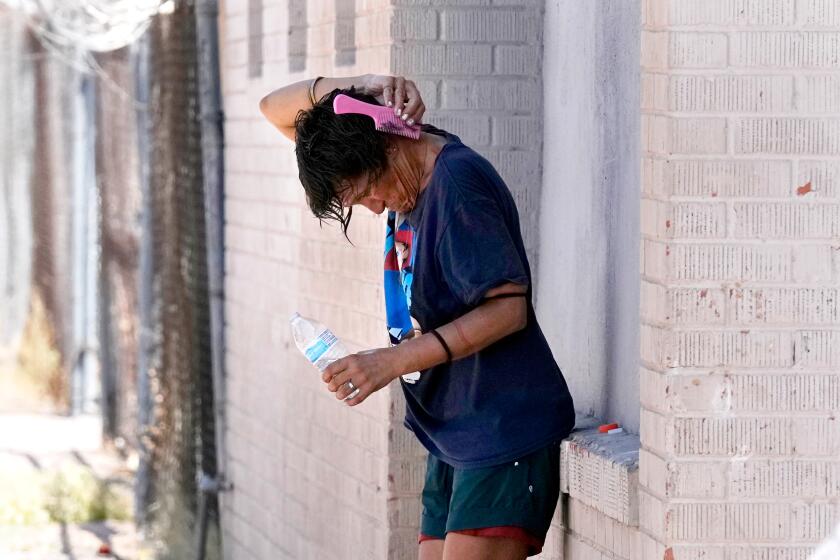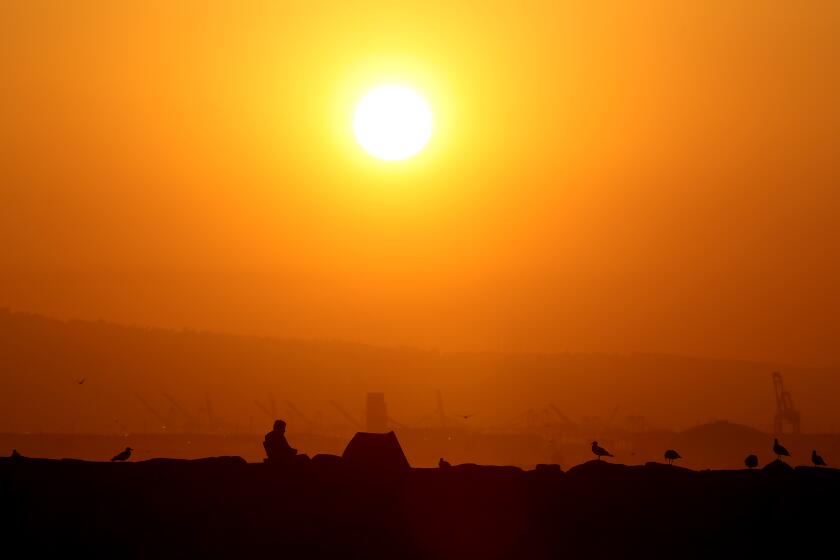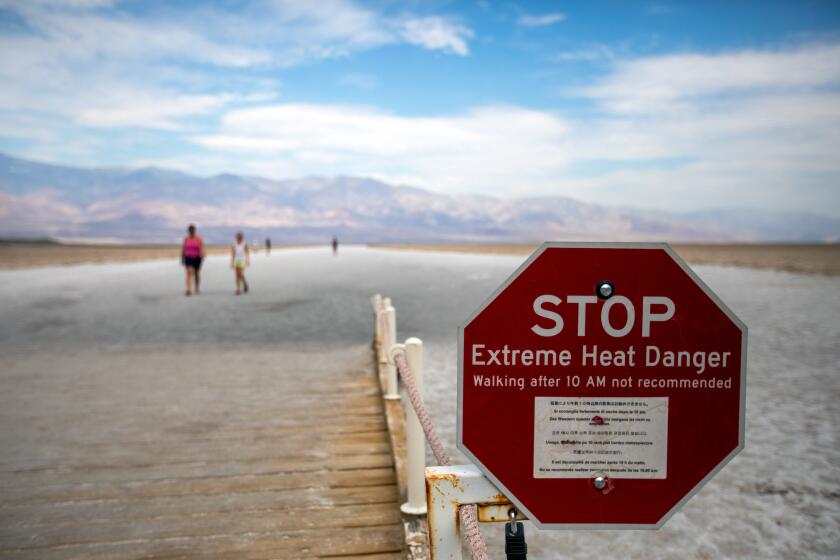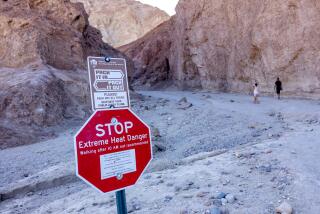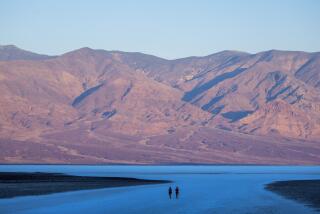Column: Dying from the heat is not a political statement

- Share via
This summer, my Instagram feed has been awash in gorgeous Italian sunsets, stunning Colorado mountain vistas and polar bears frolicking on ice in the Arctic Circle.
Now that our fears of COVID-19 have subsided, people of means are out there having fun.
But the headlines are alarming: This month looks to be the hottest ever on record for the entire planet. The seas off Florida are hot-tub hot. A powerful storm dumped as much as 9 inches of rain on Vermont, causing historic and catastrophic flooding.
Some news even seems like science fiction: Rising temperatures are causing the rapid melt of permafrost, which could unleash on the world ancient pathogens that have been frozen for millennia.
Because of the hotter climate, malaria-carrying mosquitoes, our apex predators, are moving to higher, once-cooler latitudes. By 2050, biologists predict, 50% of the world’s population may be at risk for mosquito-borne diseases such as dengue fever and Zika.
There is no longer any serious debate about whether Earth is getting hotter. It is. The scientific consensus is that the increase in temperature is directly tied to the burning of fossil fuels. As a result, weather patterns are changing. If we do not change our consumption patterns, we are in for a world of hurt. And because the heat is already upon us, we also need to figure out how to adapt better.
The ‘Gish gallop’ is the rhetorical equivalent of music’s wall of sound — it drowns out facts and reason. Donald Trump and RFK Jr. excel at it.
A shocking example occurred in 2003, when unprecedentedly high temperatures in France caused 15,000 heat-related deaths. In central Paris, a thousand vulnerable people living in top-floor, garret apartments died because the city’s famous heat-absorbing zinc roofs turned their uninsulated homes into ovens.
In the last few years, in response to the growing recognition that health and heat are intertwined, several American cities, including Los Angeles, have created the position of “chief heat officer.”
There’s preliminary evidence that assigning categories and names to heat waves, like we already do with hurricanes, could help prevent deaths.
This year, the Los Angeles City Council voted unanimously to study whether all the city’s rental units should be required to have air conditioning. (They should.)
And yet, in some quarters, climate-change denialism continues to flourish.
Now that Rush Limbaugh, the country’s foremost climate-denying dinosaur, is gone, others have taken up his anti-science mantle and have continued his legacy of turning our global crisis into just one more partisan bicker fest.
With extremely hot days increasing due to climate change, we need more accurate weather forecasts for health and survival.
“Every summer, heat waves inevitably hit the U.S. and other parts of the world, causing climate alarmists and left-leaning media outlets to demand dramatic, disastrous changes to the global energy system,” wrote one conservative commentator on the Fox News website. “Unfortunately, this summer is no different.” (The same pundit, Justin Haskins, has also asserted that wildfires are not getting worse because of climate change. Many scientific studies say otherwise. Who you gonna believe? The guy who wrote a book called “Socialism Is Evil” or the entire climate science community? Anyway.)
I just got back from a vacation in Colorado, where the Rocky Mountains are full of dead brown pine trees thanks to a years-long bark beetle infestation linked to warmer temperatures. The dead trees, of course, are perfect fuel for wildfires, which don’t distinguish between socialists and free-marketeers as they consume the landscape and foul the skies.
If you want to get a handle on the dangers our increasingly warm world presents, I highly recommend climate journalist Jeff Goodell’s terrifying new book, “The Heat Will Kill You First.”
More than 100 degrees at night in Phoenix? All-time highs two years in a row in Rome? Readers are taking note of this climate change-fueled reality.
“If there is one idea in this book that might save your life,” writes Goodell, “it is this: the human body, like all living things, is a heat machine. Just being alive generates heat. But if your body gets too hot too fast — it doesn’t matter if that heat comes from the outside on a hot day or the inside from a raging fever — you are in big trouble.”
Heat is an invisible killer, and death from overheating is a peculiar thing.
Like going broke, to paraphrase Hemingway, it happens slowly, then all at once. And by the time the body starts shutting down, there is practically no way to stop it. No amount of water, no frigid ice baths, no medical intervention can help.
Significant investment to enhance community and health-system resilience can reduce the deaths associated with heat exposure.
This month, an experienced hiker in Death Valley seemed fine one minute when he was resting in the shade chatting with my colleagues, and was dead after collapsing a few hours later, likely from the heat.
In August 2021, a Northern California couple and their 1-year-old daughter died from heat exposure and dehydration during a day hike along the Merced River’s South Fork in the Sierra Nevada.
In June, a Las Vegas man who walked outside barefoot for a few minutes ended up in the hospital with third-degree burns on the soles of his feet.
“Burn centers in the Southwest are reporting a rise in injuries to people who touch hot door handles, walk barefoot on scorching surfaces or fall on sun-scorched pavement,” reported the Wall Street Journal this month.
Experiencing extreme temperatures should not be something to check off the bucket list. This is an ongoing, spiraling, unnatural human disaster caused by our own ongoing pollution of the atmosphere.
We all tend to be pretty ignorant about the effects of heat on our health, but Texas Republican Gov. Greg Abbot enshrined his own ignorance in June when, during one of his state’s hottest summers, he signed a law repealing local regulations that require 10-minute water breaks every four hours for construction workers.
This, despite proof that mandatory water breaks for outdoor workers in some Texas cities had helped significantly decrease heat-related illness and death.
Imagine allowing people to die, and denying scientific reality along the way, just to prove a political point.
More to Read
A cure for the common opinion
Get thought-provoking perspectives with our weekly newsletter.
You may occasionally receive promotional content from the Los Angeles Times.


